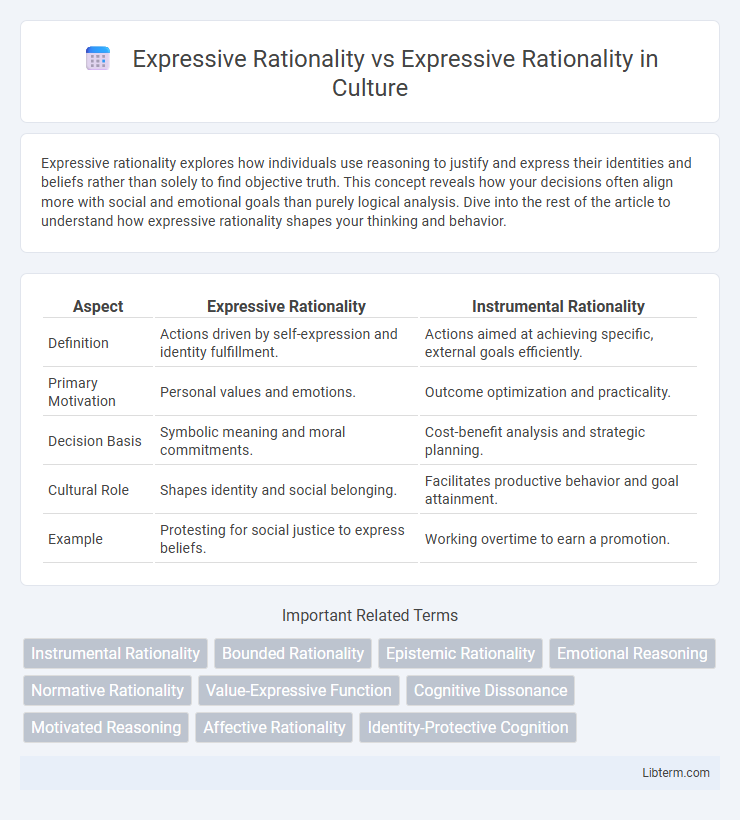Expressive rationality explores how individuals use reasoning to justify and express their identities and beliefs rather than solely to find objective truth. This concept reveals how your decisions often align more with social and emotional goals than purely logical analysis. Dive into the rest of the article to understand how expressive rationality shapes your thinking and behavior.
Table of Comparison
| Aspect | Expressive Rationality | Instrumental Rationality |
|---|---|---|
| Definition | Actions driven by self-expression and identity fulfillment. | Actions aimed at achieving specific, external goals efficiently. |
| Primary Motivation | Personal values and emotions. | Outcome optimization and practicality. |
| Decision Basis | Symbolic meaning and moral commitments. | Cost-benefit analysis and strategic planning. |
| Cultural Role | Shapes identity and social belonging. | Facilitates productive behavior and goal attainment. |
| Example | Protesting for social justice to express beliefs. | Working overtime to earn a promotion. |
Understanding Expressive Rationality
Understanding expressive rationality involves recognizing how individuals make decisions based on the desire to express identity or values rather than purely on instrumental outcomes. It explains behaviors where choices serve to communicate group membership, beliefs, or social norms even at the cost of material advantage. This concept contrasts with traditional rationality, which prioritizes efficiency and direct personal gain in decision-making processes.
Origins and Theoretical Foundations
Expressive rationality originated from social psychology and behavioral economics, emphasizing individuals' actions driven by identity, values, and expressive benefits rather than purely instrumental outcomes. Theoretical foundations trace back to symbolic interactionism and cognitive dissonance theory, highlighting how people derive utility from expressing beliefs aligning with their social groups. In contrast, instrumental rationality is rooted in classical economics and decision theory, focusing on optimizing outcomes through logical, cost-benefit calculations.
Key Characteristics of Expressive Rationality
Expressive rationality prioritizes the expression of personal values and identities over objective accuracy or instrumental outcomes, emphasizing emotional engagement and social signaling. It is characterized by selective information processing, motivated reasoning, and reliance on cultural or group norms to validate beliefs. This cognitive style often leads to entrenched opinions resistant to contradictory evidence, reflecting a commitment to self-expression rather than factual correctness.
Expressive vs Instrumental Rationality
Expressive rationality emphasizes actions driven by the desire to convey identity, values, or beliefs, prioritizing emotional and symbolic goals over practical outcomes. Instrumental rationality focuses on goal-oriented behavior aimed at maximizing efficiency, effectiveness, and pragmatic benefits through logical decision-making. Understanding the contrast between expressive and instrumental rationality is crucial in fields like behavioral economics, political science, and psychology to analyze human motivation and improve decision-making models.
Psychological Mechanisms Behind Expressive Rationality
Expressive rationality involves individuals making decisions that reinforce their identity and social group rather than maximizing objective benefits, driven by psychological mechanisms such as cognitive dissonance reduction and identity-protective cognition. These mechanisms lead people to selectively process information that aligns with their beliefs and values, enhancing their emotional attachment to group norms. The interplay of motivated reasoning and social identity theory underpins how expressive rationality shapes attitudes and behavior beyond pure instrumental logic.
Social and Cultural Influences
Expressive rationality emphasizes decision-making driven by identity, values, and social group affiliations, often overriding purely instrumental considerations. Social influences such as peer groups, cultural norms, and shared narratives shape the expressive rationality process by reinforcing beliefs and emotional attachments. Cultural context determines the symbolic meaning of actions, embedding decisions within broader social identity frameworks that prioritize allegiance over objective outcomes.
Manifestations in Political and Social Discourse
Expressive rationality manifests in political and social discourse through the emphasis on identity and emotional alignment, where individuals prioritize expressing values over factual accuracy. Instrumental rationality appears when discourse centers on pragmatic problem-solving and evidence-based arguments aimed at achieving specific policy outcomes. These contrasting modes shape persuasion strategies and influence public opinion dynamics in democratic societies.
Impacts on Decision-Making Processes
Expressive rationality influences decision-making processes by prioritizing the expression of identity or values over purely instrumental outcomes, often leading individuals to make choices that reinforce group membership or personal beliefs. Instrumental rationality, in contrast, drives decisions based on optimizing outcomes and maximizing utility, focusing on effectiveness and efficiency. The tension between these modes shapes organizational strategies and public policies, where expressive motives may override cost-benefit analysis, impacting overall rational decision-making efficacy.
Criticisms and Limitations of Expressive Rationality
Expressive rationality faces criticism for its tendency to prioritize symbolic actions over instrumental outcomes, often leading to decisions that may not maximize utility or efficiency. This approach can reinforce biases and group conformity, limiting open discourse and reducing the adaptability of decision-making processes in complex environments. Critics argue that expressive rationality may undermine objective evaluation, resulting in choices driven more by identity affirmation than by rational problem-solving.
Future Directions and Research Opportunities
Exploring future directions in expressive rationality research emphasizes integrating interdisciplinary approaches from cognitive science, behavioral economics, and social psychology to better understand how emotions influence decision-making processes. Advancements in neuroimaging and machine learning provide promising opportunities to model the dynamic interplay between expressive and instrumental rationality in various social contexts. Further research can also investigate the impact of cultural and technological changes on expressive rationality, enhancing predictive frameworks for collective behavior and policy design.
Expressive Rationality Infographic

 libterm.com
libterm.com